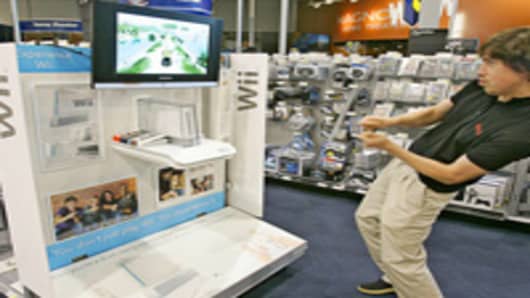The video game industry stumbled out of the gate in 2010, posting a 13 percent decline in January sales compared with 2009. But despite the negative news, observers are still expecting improvements in the months to come.
The industry posted total sales of $1.17 billion for the month, according to market research firm NPD Group. Sales of video game software — generally seen as the key indicator of the industry’s health — were down 12 percent, coming in at $597.9 million versus $682.6 million in 2009.
The drop was higher than analysts were expecting. (Consensus had ranged from a 4 percent to 10 percent decline in software sales.)
Hardware sales took a steep drop — falling 21 percent from 2009. That surprised analysts who were expecting the number to be relatively flat. The Nintendo Wii — which remained the industry’s best-selling gaming system, moving nearly 466,000 units — fell far short of expected sales, perhaps because the system is once again experiencing shortages at retail.
Hardware sales were also down 84 percent from December, but that was expected as January usually experiences a post-holiday lull.
Among the other major console makers, Microsoft moved just under 333,000 Xbox 360s, thanks in large part to the launch of Electronic Arts’ “Mass Effect 2,” which was exclusive to the system. Sony, meanwhile, sold 277,000 PlayStation 3s.
Analysts are not expecting a major ramp-up of sales for either the Xbox 360 or PS3 until later in the year. That’s when Microsoft and Sony are scheduled to release new motion-control sensors and highly anticipated games for each system, including “Halo: Reach” for the 360 and “Gran Turismo 5” for the PS3.
Analysts also believe both companies will once again cut prices on the systems as the holiday season draws closer, as they did in 2009. Some publishing heads, including Activision Blizzard COO Michael Morhaime, have begun calling for a price drop already.
"If you look at consoles, I think you are going to need to see hardware price declines given the economic uncertainties that we have,” he said in an earnings call this week.
The consensus is that whenever the price drops come, they will likely be a $50 reduction.
While the January numbers were disappointing, the game release calendar for February and March appears to be loaded with potential hits, causing many to believe that the first quarter will still end up in positive territory. Among the titles en route are Take Two Interactive Software’s just-released “Bioshock 2” and Sony’s “God of War III”.
For January software sales, Nintendo’s “New Super Mario Bros. Wii” topped the charts, selling 656,700 copies. “Mass Effect 2” sold a respectable 572,100 copies. (EA’s other new release, “Army of Two: The 40th Day,” was less impressive, selling just 246,500 units.)
To demonstrate the staying power of Nintendo’s unusual titles, January’s third-best selling game was “Wii Fit Plus,” which sold 555,700 copies. A year ago, a very similar version of that game sold 777,000 copies. That’s less than a 30 percent drop in 12 months for virtually the same game. (“Wii Fit Plus” added a few new exercise routines and games, but was fundamentally the same product.)


